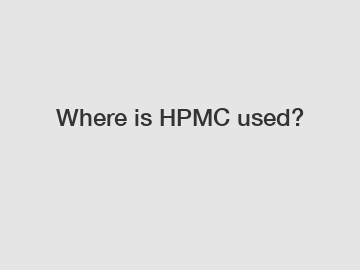Where is HPMC used?
Where is HPMC used?
HPMC, or Hydroxypropyl Methylcellulose, is widely used in various industries due to its unique properties and versatile applications. This synthetic polymer is derived from cellulose, a natural substance found in plant cell walls. With its ability to dissolve in water and form a gel-like consistency, HPMC finds applications in pharmaceuticals, construction, food, cosmetics, and more.
In the pharmaceutical industry, HPMC is primarily used as a coating agent for tablets and capsules. It helps to protect the active ingredients from degradation and provides a smooth and glossy finish. Additionally, HPMC enhances the swallowability of the dosage form by reducing its tendency to stick to the throat, improving patient compliance. The controlled release properties of HPMC also make it an ideal choice for sustained-release formulations, ensuring a prolonged therapeutic effect.

In the construction industry, HPMC is commonly used as a thickener and binder in cement-based products. By adding HPMC to cement, it improves workability and provides better adhesion to surfaces. The viscosity control of HPMC allows for easy application and enhanced sag resistance in plastering and tile adhesives. Moreover, the water retention capacity of HPMC allows for better hydration of cement, reducing the risk of cracking and increasing the durability of the final product.
In the food industry, HPMC is used as a food additive to improve texture, stabilize emulsions, and increase the shelf life of products. It is commonly found in sauces, dressings, bakery goods, and dairy products. HPMC acts as a thickener and stabilizer, preventing phase separation and maintaining a uniform consistency. Its film-forming properties also help to prevent moisture loss, prolonging the freshness of food items.
In the cosmetics industry, HPMC is utilized in a variety of personal care products such as lotions, creams, and shampoos. It acts as a film-forming agent, providing a protective barrier on the skin or hair, reducing moisture loss and enhancing the overall appearance. HPMC also acts as a thickener and emulsifier, improving product stability and texture. Its compatibility with other ingredients makes it a popular choice among formulators.
The extensive use of HPMC across different industries highlights its significant contributions to various applications. Its unique properties, such as solubility, viscosity control, and film-forming ability, make it an essential ingredient in pharmaceuticals, construction materials, food, and cosmetics. The versatility of HPMC not only improves product performance but also enhances the overall consumer experience. As advancements in technology continue to emerge, the demand for HPMC is expected to grow, leading to further innovations and advancements in its applications.
If you are looking for more details, kindly visit Hydroxy Ethyl Methyl Cellulose, Fast dispersion effect HPMC in cold water, MATECEL hpmc.


